Don Clinchy's blog
Review: West of Memphis
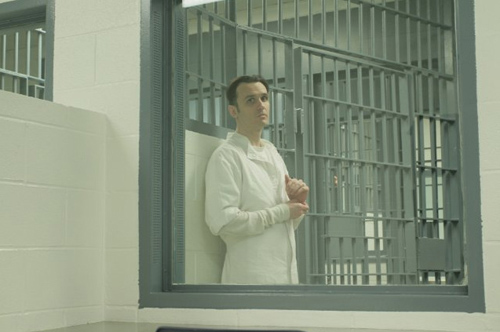
The history of American criminal justice abounds with cases of justice denied, delayed and miscarried, but there are few cases more egregious than that of the West Memphis Three.
The three men were convicted as teenagers in 1994 of murdering three eight-year-old boys in West Memphis, Arkansas in 1993. Damien Echols was sentenced to death, Jessie Misskelley, Jr. to life imprisonment plus two 20-year sentences and Jason Baldwin to life imprisonment. Amid the hysteria over Satanism in the 1980s and early 1990s, the prosecution easily convinced jurors that the three rebellious teens killed the boys as part of a satanic ritual.
After the sentences were handed down, questions about the case arose almost immediately. Criminologists and forensic experts criticized how the police handled the crime scene and the evidence, and charged that the prosecution based its case on unfounded accusations rather than any evidence linking Echols, Misskelley and Baldwin to the crime. But despite widespread suspicion that the three were innocent, their convictions were upheld on appeal.
The horrendous crime and the three men's seemingly futile 18-year struggle to prove their innocence are the subjects of West of Memphis, a gory and chilling documentary about an unbelievable failure of justice. The film isn't for the squeamish, but it's an eye-opener for anyone not familiar with the famous case and a stark refresher course for viewers who are.
SXSW Review: The Bounceback
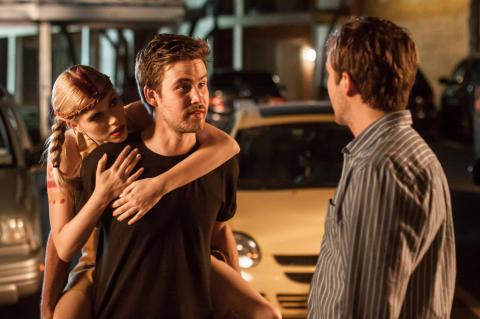
The Bounceback could have been just another clichéd romantic comedy about angst-filled twentysomethings looking for love. (Okay, let's be honest: they're looking for sex.) But thanks to Austin filmmaker Bryan Poyser's considerable talents -- he graced us with Dear Pillow and Lovers of Hate -- the film is a wryly observant take on relationships and popular culture and a cut above most movies in its genre.
Shot in Austin and awash in River City landmarks and youthful culture, The Bounceback centers on New York City medical student Cathy (Ashley Bell) and her ex-boyfriend Stan (Michael Stahl-David), a wannabe actor currently delivering pizzas in Los Angeles. Both are former Austinites, and when lonely Stan learns that Cathy will visit her friend Kara (Sara Paxton) in Austin for a weekend, he hastily books a flight to Austin also, hoping to cross paths with his ex while partying with his friend (and Kara's former boyfriend) Jeff (Zach Cregger).
If all this sounds like a setup for lots of cutesy romantic semi-hilarity, rest assured that it isn't. Stan's plan for a not-quite-coincidental reunion with Cathy falls apart before he even arrives in Austin; he's so busted when Kara and Jeff see each other at the airport while waiting for Cathy and Stan. Things spiral downward from there; Stan discovers that Jeff has taken up Air Sex (think air guitar, but without guitars and with sex) and seems content to spend his time with an infantile crew of beer-swilling horndog roommates. Serious student Cathy finds that Kara is no more mature than Jeff; her major goal for the weekend is to help Cathy get laid.
SXSW Review: Loves Her Gun
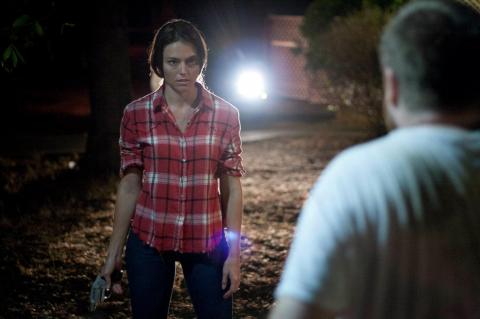
Yeah, she loves her gun all right.
Well, not really the gun itself. What the protagonist of Loves Her Gun really loves is the feeling of security and power a gun gives her. She sleeps better at night knowing it's there in case she needs it. She's no gun nut -- she's just wants to stop being afraid. Can't blame her for that, right?
Austin filmmaker Geoff Marslett has delivered a stunning new film with Loves Her Gun, a stylish and captivating mix of two genres: twentysomething angst-fueled indie drama and horrifically timely message film. Plenty of movies have shown us aimless young adults indulging in Austin's slacker milieu, but none do so as tragically as Loves Her Gun. The movie deservedly won the SXSW Louis Black Spirit of Texas Award earlier this week.
The woman who loves her gun is Allie (Trieste Kelly Dunn), a young Brooklynite with no job and no desire to keep dating her annoying boyfriend. After a brutal assault, she ditches her life in New York and hitches a ride to Austin in an RV with her friend Xoe (Ashley Spillers) and Xoe's fellow members of a karate-themed rock band.
SXSW Review: Before You Know It

You never think about getting older when you're younger. But before you know it creeps up on you, and you're there already.
-- Robert Mainor, Before You Know It
Old age can be hard enough for anyone lucky enough to reach that stage of life; imagine how much more difficult it can be for gay people in a society that hasn't fully accepted them.
The lives of senior citizens in the LGBTQ community are the subject of Before You Know It, a deeply moving documentary that presents the often unhappy and seldom-discussed realities of being elderly and gay. Austin filmmaker PJ Raval's ambitious film introduces us to three elderly gay men who lead disparate lives, and their stories tell us much about a largely ignored segment of our society.
The men are all gay, but have little else in common. Dennis Creamer is a widower who did not come out until his seventies, after his wife died. He divides his time between a Florida trailer park and Rainbow Vista, an LGBTQ senior living facility in Portland. Often lonely and looking for a new partner, Creamer sometimes wears women's clothing and goes by the name Dee, which he does openly at Rainbow Vista and on gay cruises and vacations.
SXSW Review: Getting Back to Abnormal
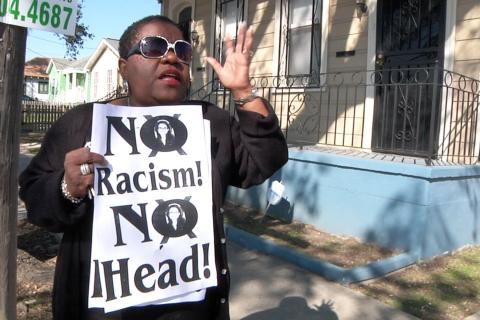
In New Orleans, we have some of the blackest white people and some of the whitest black people you're ever going to meet.
-- Ninth Ward resident Henry Irvin, Getting Back to Abnormal
Whether narrative or documentary, films about New Orleans often present the city as a collection of Big Easy clichés, as if life in the city revolves around po-boys, Bourbon Street, second-line parades and political corruption.* Fortunately, the superb documentary Getting Back to Abnormal looks beyond the clichés and far deeper into New Orleans culture. Focusing on a New Orleans City Council race but encompassing a much broader look at politics, race and culture in the city, the movie is a fascinating study of how New Orleans has changed after Hurricane Katrina and the ensuing floods.
The film's central story is the heated 2010 city council race between Councilmember Stacy Head, a self-proclaimed corruption fighter known for her abrasive, politically incorrect style, and Corey Watson, a minister and civic leader. Head is the first white official to represent the majority black District B in more than 30 years. Watson is black, and his challenge to Head raises the issue of how racial politics will factor into the race, given that New Orleans' black population decreased drastically after Katrina.
SXSW Review: euphonia
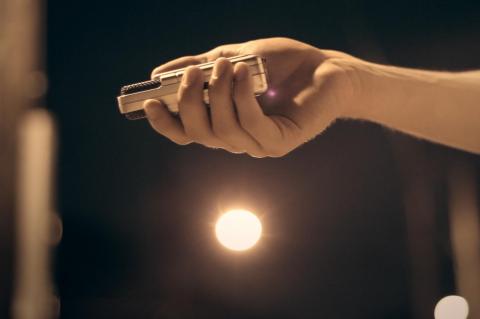
We live in a noisy world, but how often do we really listen to the noise?
The unnamed teenage protagonist of euphonia listens often, to the point of distraction and obsession. Writer/director Danny Madden's film follows the teen as he tires of the dull noise of suburbia around him and, armed with a handheld sound recorder, searches for better sounds.
The teen (played by Madden's younger brother, Will) records sounds as he ventures around his suburban neighborhood and the downtown area of an unnamed city. He records an all manner of sounds, such as the noises made by hitting objects with sticks, rustling leaves, students reading poetry in class, gurgling fountains, traffic, children playing and street musicians. When he begins dating a girl in his English class (also unnamed and played by Maria Decotis), she hesistantly lets him record many of their conversations also.
The teen uses his recorder as a means to connect with the world around him and, eventually, to separate himself from it. As he builds a library of sounds, he finds himself more connected to the sounds than their sources, drifting away from reality and distancing himself from the monotony of his life.
SXSW Review: Imagine
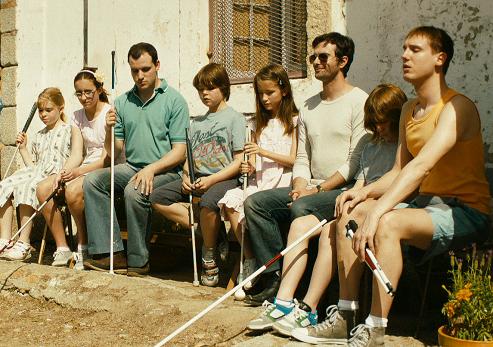
The aptly titled movie Imagine is about blind people imagining what they cannot see, but it also encourages sighted people to imagine what life is like for the blind.
Set and filmed in Lisbon, Portugal, Polish filmmaker Andrzej Jakimowski's lyrical feature film tells the story of Ian (Edward Hogg), a British spatial orientation instructor who works with blind and visually impaired patients living at a renowned Lisbon clinic. The patients are an international group of children and young adults; Ian's job is to teach them mobility skills and help them gain the confidence to explore their surroundings.
Blind himself, Ian navigates using echolocation, which relies on acoustic echoes to define the positions and sizes of objects. Similar to the way bats and dolphins use ultrasonic sound to navigate, Ian locates obstacles in his path by listening for echoes while clicking his tongue, snapping his fingers and walking in special shoes that create loud footsteps.
SXSW Review: Much Ado About Nothing
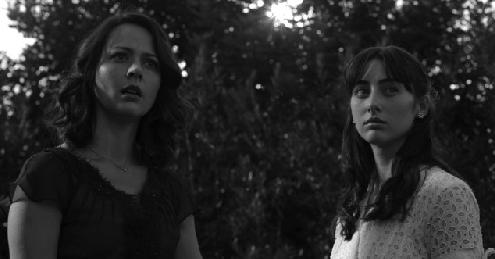
At a recent after-work happy hour, I mentioned that Joss Whedon's new movie is Much Ado About Nothing. My mostly twentysomething co-workers' reactions were entirely predictable: Joss Whedon? Shakespeare? A Joss Whedon Shakespeare movie? OMG OMG OMG! A Joss Whedon Shakespeare movie!
As one co-worker said, "You had me at Joss Whedon."
Yeah, people, I get it. I totally understand your enthusiasm. One of Hollywood's hottest talents has taken a detour from his usual fantasy fare and delivered something unexpected: a new twist on one of William Shakespeare's most popular plays. OMG!
To be clear, I'm not mocking Whedon or his fans. But I must explain that while I've seen a fair number of Shakespeare's plays and certainly appreciate his talents, I've seen only one of Whedon's films -- The Cabin in the Woods, which I enjoyed very much -- and none of his TV shows, not a single episode. Yes, I'm that unhip. I don't know enough to pass judgment on or muster much enthusiasm for his work. But I do know a lot of very smart, sophisticated and discerning people who madly adore Whedon, so he must be doing a lot of things right.
Is Whedon's vision of Much Ado About Nothing any good? Yes. It's unusual, clever, creative and expertly rendered. My Whedon-worshipping friends won't be disappointed and will recognize many actors from other Whedon endeavors, which I'm sure will add to the fun. It's also a creative risk, and I credit Whedon for taking it.
Movies This Week: March 8-14, 2013

While the SXSW Film Festival isn't the only thing happening in town this week, it's almost the only thing happening.
Heading to the festival? You know the drill: Avoid driving and parking downtown if you can (MetroRail has become a popular alternative), get in line much earlier than you think you need to, and consult Slackerwood's über-handy SXSW Film Fest Omnibus Survival Guide for everything you need to know about navigating the madness of Austin's largest film festival. Godspeed, indie film fans -- and I hope you catch a glimpse of Matthew McConaughey or your favorite film celebrity or at least one of Austin's bicycle thong guys.
The SXSW Community Screenings offer free films that anyone can see, first-come, first-served, at the Boyd Vance theater in the Carver Museum. The AFS Shortcase, which our contributor Debbie Cerda helps program, is one of the highlights. The Carver Museum is not quite downtown, and thus has plenty of parking.
Also, UT's Women in Cinema will host an unofficial SXSW panel, "SXSW Women in Cinema," on Wednesday at 7:30 pm at the University of Texas: Communications Building B (CMB), Studio 4D. The panel is free and open to the public. The filmmaker panelists are Jillian Schlesinger (Maidentrip), Lauren Wolkstein (Social Butterfly), Julia Pott (The Event), Lola Bessis (Swim Little Fish Swim), Frances Bodomo (Boneshaker) and Celia Rowlson-Hall (The Audition, Si Nos Dejan).
Movies This Week: February 15-21, 2013
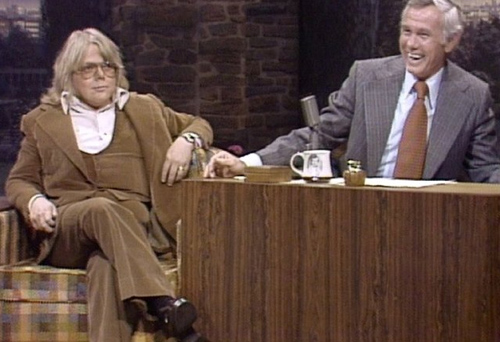
In the interest of brevity, I'll ignore this week's new releases (helpful hint: you should, too!) and go straight to the impressive lineup of special screenings.
Few film franchises are more impressive than Michael Apted's Up documentary series. Debuting in 1964 with Seven Up, which introduced viewers to 14 British 7-year-olds, the groundbreaking series has followed the progression of their lives with a new movie every seven years. They're now 56, and the latest installment, 56 Up, is screening Monday and Tuesday at the Stateside to kick off the new Stateside Independent film series.
Film fans old enough to remember the Seventies (and younger fans who, for reasons not well understood, think the Seventies were cool) shouldn't miss Paul Williams Still Alive (pictured above), Stephen Kessler's acclaimed documentary about the songwriter and pop cultural icon's phenomenal career and difficult personal life. Paul Williams Still Alive screens on Monday (and also on Saturday, February 23) at the Alamo Drafthouse Ritz. Read Mike's thoughts on it from SXSW 2012.
Cine Las Americas continues its Latin American comedy series with 25 Watts, the story of a weekend in the lives of three suburban Montevideo slackers. The three men make an art of doing not much of anything in this 2001 Uruguayan film. 25 Watts screens for free at the Emma S. Barrientos Mexican American Cultural Center on Wednesday.
As always, the Austin Film Society's Essential Cinema series offers something unusual: the Iranian import This Is Not a Film, a riveting 24-hour portrait of renowned filmmaker Jafar Panahi, who for 20 years has circumvented the Iranian government's ban on his making films. AFS presents This Is Not a Film on Tuesday at the Alamo Drafthouse Village.

